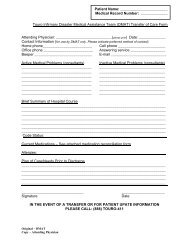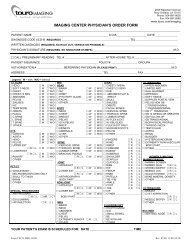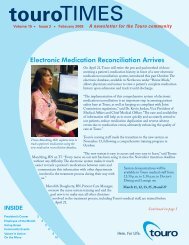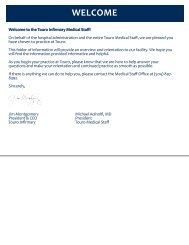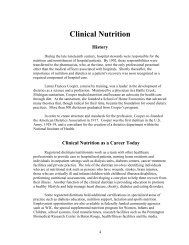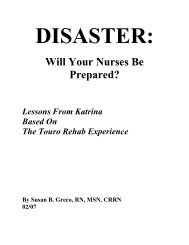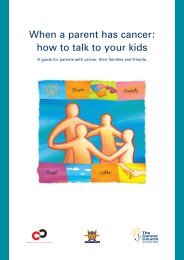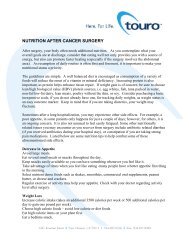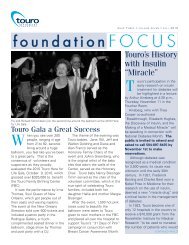INTEGRATIVE NUTRITION - Touro Infirmary
INTEGRATIVE NUTRITION - Touro Infirmary
INTEGRATIVE NUTRITION - Touro Infirmary
Create successful ePaper yourself
Turn your PDF publications into a flip-book with our unique Google optimized e-Paper software.
added to diet, soy protein can help lower total cholesterol and the more “atherogenic” lowdensity lipoprotein (LDL) cholesterol.Isoflavones, a component of soy, may have estrogen-like effects in the body. As such, thoseindividuals with hormone-sensitive cancers (i.e. breast, ovarian, or uterine), may be slow toincorporate soy in the diet. At present, there is not enough evidence based research to suggestthat women with estrogen-sensitive breast cancer should avoid soy products. Certainly, if youare undergoing a treatment protocol such as a clinical trial that bans soy consumption, you mustmaintain compliance.AlcoholAccording to the American Dietary Guidelines for Americans, drinking in moderation is definedas one drink per day for women and 2 drinks per day for men, respectively. One drink isequivalent to one 12 ounce beer, 4 ounces of wine, 1.5 ounces of 80-proof spirits, or 1 ounce of100-proof spirits. If you usually consume alcohol, consider that alcohol can irritate your mouthand throat and may exacerbate treatment related side effects. Be sure to discuss your choice withyour medical oncologist.The association between heavy alcoholic drinking and increased risk of certain cancers, namelyliver, head and neck, and esophageal, comes as no surprise. However, now researchers havelearned that moderate alcoholic drinking (defined as approximately 2-4 drinks per day in studies)may increase breast cancer risk in women - more specifically, women who developed breasttumors that were estrogen-receptor and progesterone-receptor positive. To learn more about thestudies that were conducted, refer to the American Institute for Cancer Research websitewww.aicr.org/ or the National Cancer Institute website www.cancer.gov.VitaminsAs nutritionists, we are often asked if it is acceptable or beneficial to take a multivitamin. Amultivitamin is not meant to be a substitution for a balanced diet. Rather, a multivitamin shouldserve as nutritional lagniappe – a little something extra as day to day intake is not alwaysoptimal. Patients are encouraged to eat a variety of foods in an attempt to not only meet thebasic energy needs of the body, but also to minimize newfound fatigue, often a treatmentassociated side effect. If your nutritional intake is inadequate (often secondary to a loss ofappetite or taste changes), be sure to select a one-a-day type of supplement providing 100 percentof the RDAs of vitamins and minerals.Before selecting a multivitamin, vitamin, or mineral at the store, we recommend reviewing theUSP website (www.usp.org/aboutUSP/) for a list of standardized products. All products that areUSP certified contain a USP notation on the label. In addition to checking for a USP notation, besure to check the expiration date before purchase and ingestion. Also, do not forget to take thevitamin or mineral supplement with food as this can help with absorption.



